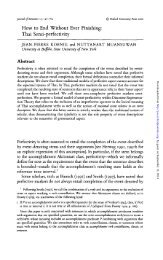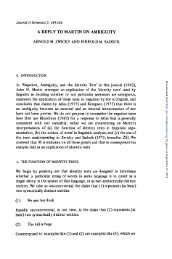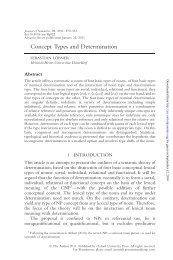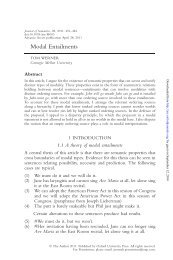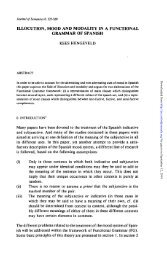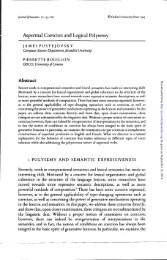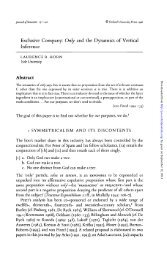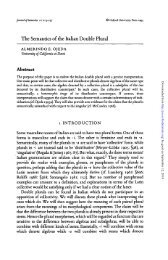Lexical Pragmatics - Journal of Semantics
Lexical Pragmatics - Journal of Semantics
Lexical Pragmatics - Journal of Semantics
Create successful ePaper yourself
Turn your PDF publications into a flip-book with our unique Google optimized e-Paper software.
Reinhard Blutner i$7I find it important to apply the ideas to other possibly more complex andmore realistic examples than those considered here. Moreover, methods areneeded that allow one to measure the values <strong>of</strong> the probabilistic parametersthat control and organize conceptual knowledge.Seen from a moderately distant viewpoint, the standard accounts <strong>of</strong><strong>Lexical</strong> <strong>Semantics</strong> may appear as an incoherent research field which is atodds with itself. As an endeavour that has to access Grammar, <strong>Semantics</strong>,and aspects <strong>of</strong> utterance interpretation at the same time it multiplies thediversion <strong>of</strong>. these disciplines. Overstretched by the task <strong>of</strong> theoryformation, it either combines theoretical rigour with descriptive poverty,or, more predominantly, it leads to linguistic anecdotalism, collecting prettyand curious observations without theoretic control. I sense that it is theinadequacy or the lack <strong>of</strong> a genuine pragmatic component that has led tothis situation. In so far as <strong>Lexical</strong> <strong>Pragmatics</strong> tries to take pragmaticsseriously—especially the conception <strong>of</strong> conversational implicature—and inso far as it is explicit about this component, it may substantiate a division <strong>of</strong>labour between grammatical and pragmatic aspects <strong>of</strong> the lexicon. This maybroaden the way for overcoming the unfortunate situation just mentioned.Perhaps most details concerning the main ideas <strong>of</strong> the present account inconcrete terms may prove false in the future. This may concern, first at all,the Economy principles and their interaction. In order really to justify thedetails <strong>of</strong> these principles we need more empirical evidence and studies. Butit is also crucial to discover the reasons that explain why the principles arejust as they are. This brings us to a reductionist programme as is currentlypursued in the domain <strong>of</strong> Integrative Connectionism (e.g. Smolensky 1995). Afirst attempt at achieving a full reduction <strong>of</strong> Speaker's economy (I-principle)and Hearer's economy (Q-principle) to connectionist principles is currentlyunder way.AcknowledgementsI am grateful to Manfred Bierwisch, Paul David Doherty, Bart Geurts, Gerhard Jager,Thomas Jiingling, Annette Lefimdllmann, Chris Pirion, and Rob van der Sandt for usefulcomments on earlier versions <strong>of</strong> this paper. Special thanks go to an anonymous referee <strong>of</strong>the JS. I do not, however, intend to imply by this that they endorse my approach. Inparticular, Thomas and Manfred don't believe a word <strong>of</strong> it.Downloaded from http://jos.oxfordjournals.org/ by guest on September 12, 2014REINHARD BLUTNER Received: 18.10.97Humboldt University, Berlin Final version received: 05.04.98Jagerstrasse 10-1110117 BerlinGermanye-mail: blutner@german.hu-berHn.de



